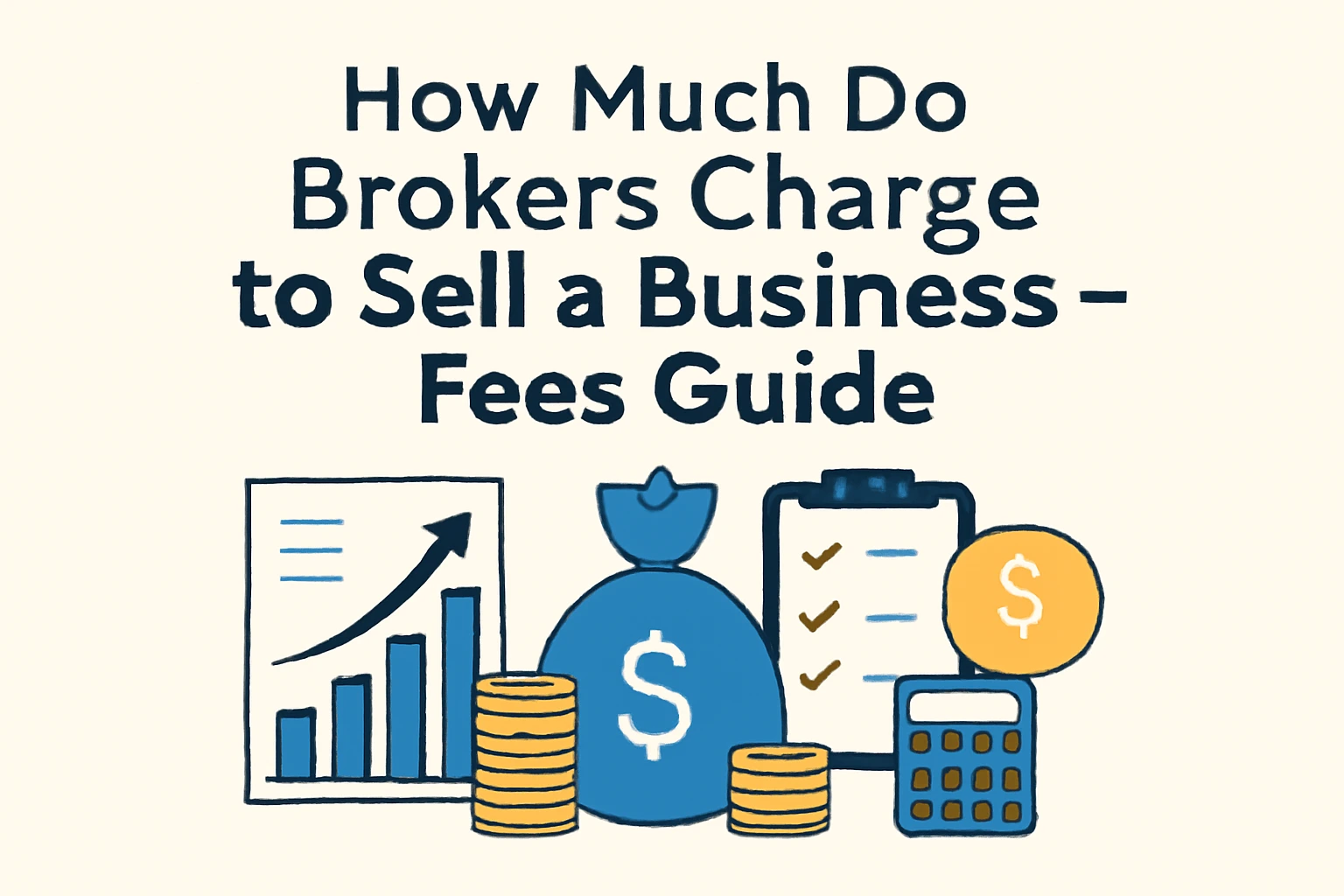Introduction – Understanding Business Broker Fees
Selling a business is a major decision, and many business owners turn to a broker to make the process smoother. A broker helps with valuation, finding buyers, and guiding negotiations, but one of the first questions owners ask is how much do brokers charge to sell a business. Understanding broker fees matters because costs can directly impact the final sale price and profits. For more insights into global business trends and resources, visit All Worldwide News.
What Does a Business Broker Do When Selling a Business?
A business broker plays a crucial role in the selling process by acting as a bridge between the business owner and potential buyers. When you plan to sell your business, the broker not only guides you through the complex steps but also helps you avoid costly mistakes. From preparing your business for sale to managing the entire selling process, a broker ensures everything runs smoothly and increases the chances of achieving the best possible price. Their broker fee is tied to the expertise and services they provide, making them an important partner when selling a business.
Key Responsibilities of a Business Broker
- Business valuation to determine the right sale price.
- Marketing & advertising to attract serious buyers.
- Buyer screening to ensure financial capability.
- Negotiation & closing to finalize the transaction efficiently.
Typical Fee Structures in Business Brokerage
When working with a business broker, understanding the fee structure is essential because it impacts how much you earn after the sale of your business. Brokers typically charge in different ways, depending on the type of business, the sale price, and the level of support they provide. Most business broker fees Fees are based on a percentage of the sale, but some may also include upfront costs or ongoing payments, which can affect the overall pricing and fees. Knowing these details helps a business owner Compare options, negotiate better terms, and plan for the total cost of hiring a broker to help you sell your business. selling a business.
Success Fee (Commission-Based)
This is the most common structure where a broker charges a percentage of the final sale price, usually called the success fee.
Upfront Fees
Some brokers charge an upfront fee to cover marketing or listing costs before they begin the process of helping you sell your business.
Retainer Fees
A retainer fee is a monthly payment to keep the broker actively involved in managing the business sale.
Post-Sale Fees
Certain brokers apply post-sale charges for additional services after the business is sold.
| Fee Type | Description | When It’s Charged | Average Range |
|---|---|---|---|
| Success Fee | Commission on final sale price | At closing | 8% – 12% |
| Upfront Fee | Paid before marketing | At engagement | $2,000 – $15,000 |
| Retainer Fee | Ongoing monthly support | Throughout process | $1,000 – $5,000 |
| Post-Sale Fee | Charged after deal finalization | After sale | Varies |
How Much Do Business Brokers Typically Charge?
The cost of hiring a business broker depends on the size and complexity of the sale. On average, when owners ask how much do brokers charge to sell a business, the answer is usually between 8% and 12% of the final sale price. However, fees can vary depending on whether you’re selling a small shop, a mid-sized company, or working with M&A advisors for larger businesses. Understanding these differences helps a business owner set realistic expectations and choose the right broker to handle the sale of your business effectively.
Broker Fees for Small Businesses
Brokers typically charge higher percentages, often 10%–12%, since smaller businesses have lower sale prices.
Broker Fees for Mid-Sized Businesses
For companies with moderate value, fees usually fall in the 8%–10% range, balancing workload with profitability.
M&A Advisors and Large Business Fees
M&A firms or advisors handling larger transactions may charge 2%–5%, but total costs are higher because deals are more complex.
Factors That Affect Broker Fees
Broker fees are not the same for every business sale. When asking how much do brokers charge to sell a business, the answer often depends on several key factors. A business broker looks at the size of your company, industry type, and overall market conditions before setting a commission. The experience of the broker and the demand in your location also play a big role in determining the business broker commission. By understanding these variables, a business owner can better anticipate the cost of selling a business and negotiate a fair business broker fee that matches their situation.
Size of Your Business
Larger companies often pay a lower percentage, while smaller businesses face higher commission rates.
Type of Business Being Sold
Specialized industries may require extra effort, leading to higher business broker commission rates. broker fees.
Market Conditions
In strong markets, competition may lower fees, while in weaker markets brokers may charge a minimum fee.
Broker Experience
An experienced broker with a strong track record may justify higher charges.
Location and Buyer Demand
Areas with high buyer demand can sometimes lead to lower commission rates.
Negotiating Broker Fees – Can You Lower Costs?
Many business owners wonder if they can reduce the cost when asking how much do brokers charge to sell a business. While brokers typically charge standard commissions, there is room for negotiation. A business broker may adjust their fee structure based on the type of business, expected sale price, and the services required. By discussing options openly, you can avoid unnecessary charges and secure a fair deal. Successful negotiation not only helps lower overall expenses but also ensures you still receive the expertise needed for a smooth business sale.
Strategies for Reducing Broker Fees
- Comparing multiple brokers to evaluate pricing and services.
- Asking for a flat fee or tiered fee Instead of a straight percentage, brokers use a fee based structure to help you sell your business.
- Negotiating upfront fees to reduce initial costs.
- Requesting detailed fee breakdowns for transparency and accountability.
Upfront Fees vs. Success Fees – Which Is Better?
When business owners consider how much do brokers charge to sell a business, one major question is whether to agree on upfront fees or a success fee. Both fee structures have advantages and drawbacks depending on the size of your business, the selling process, and the broker’s approach. Some brokers prefer upfront payments for marketing and preparation, while others rely solely on a commission after the business sale Closes can vary depending on the pricing and fees associated with the broker. Understanding the pros and cons helps you choose the structure that protects your interests while keeping costs aligned with your expectations.
Pros of Upfront Fees
Provides commitment from the broker and ensures resources for marketing.
Cons of Upfront Fees
Risky if the business doesn’t sell, as costs are paid regardless of outcome.
Pros of Success Fees
Encourages brokers to work harder since payment comes only after a sale.
Cons of Success Fees
Commission rates may be higher, cutting into final profits from the sale of your business.
Additional Costs and Post-Sale Fees from Business Brokers
Beyond standard broker commissions, sellers may face additional costs during the business sale process. These expenses often vary depending on the broker’s agreement, the size of your business, and deal complexity. Being aware of them helps avoid surprises and keeps your selling budget on track.
Marketing & Advertising Costs
Some brokers charge extra for premium listings, online ads, or targeted campaigns.
Legal & Transaction Costs
Sellers may need to cover attorney fees, contract drafting, and due diligence expenses.
Hidden Charges to Watch Out For
Always review contracts carefully, look out for admin fees, document handling, or post-sale service charges.
Selling a Business Without a Broker – Is It Worth It?
Some owners consider selling on their own to save on business broker fees, but it’s important to weigh the pros and cons before making that decision. Handling the process without professional guidance may work in certain cases, yet it also brings challenges that could impact the final sale value.
Advantages of Selling Without a Broker
You save commission costs, maintain full control, and directly manage negotiations with buyers.
Disadvantages of Selling Without a Broker
Lack of market expertise, weaker buyer reach, and risk of undervaluing the business can lead to costly mistakes.
Learn More About Brokers and Business Sales
If you want to explore more insights on how brokers operate, deal structures, and the latest trends in business sales, check out All Worldwide News. It provides valuable articles and updates that can help business owners understand the selling process more effectively. Using such trusted resources ensures you stay informed about negotiation strategies, fee models, and market movements before making big decisions.
FAQs – Business Broker Fees Explained
How much do business brokers charge on average?
Most brokers charge 8%–12% commission on the final sale price.
Do all brokers charge upfront fees?
No, some ask for Upfront marketing or retainer fees may be required by brokers to help you sell your business., while others rely only on commission.
Can you negotiate broker fees when selling a business?
Yes, many brokers are open to charging a monthly fee for their services. tiered or flat-fee structures.
Are business broker fees tax deductible?
Often, yes — consult a tax advisor for your case.
Do larger businesses pay higher broker fees?
Not always, but M&A deals usually involve larger advisory fees.
What happens if my business doesn’t sell?
You may still pay marketing or upfront costs.
How are M&A advisor fees different from business brokers?
M&A advisors charge higher retainers and success fees for complex deals.
Is it cheaper to sell a business without a broker?
You save fees, but risk lower valuations and limited buyer reach.
Conclusion – Choosing the Right Broker for Your Business Sale
Selecting a business broker isn’t just about the lowest fee, it’s about finding someone who brings real expertise and buyer access to the table. Clear fee transparency helps you avoid unexpected charges and ensures trust throughout the process. While high commission rates may seem costly, the right broker can often secure a stronger sale price that outweighs the expense. For small business owners, the key is to balance affordable costs with proven track records, ensuring you partner with a broker who aligns with your goals and protects your long-term financial interests.













